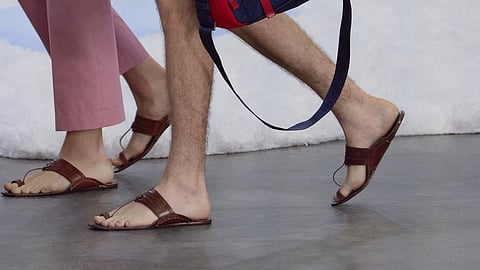Can a ₹1.2 lakh Kolhapuri chappal trip up Prada on the runway of ethics?
The luxury Italian label is facing legal heat over a pair of toe-ring leather sandals, priced at around ₹1.2 lakh, which were showcased at the Prada Men’s Spring/Summer 2026 show in Milan. Critics say the footwear is a near-replica of the traditional Kolhapuri chappal — a handcrafted, centuries-old design that carries Geographical Indication (GI) status in India since 2019.
PIL filed in Bombay HC seeks compensation for Kolhapuri artisans, co-branding with Prada, and stricter GI protections
Now, a public interest litigation (PIL) filed in the Bombay High Court has accused the brand of cultural appropriation, misrepresentation, and unauthorised commercial exploitation. The plea, submitted by intellectual property rights (IPR) lawyer Ganesh Hingmire, demands compensation for Kolhapuri artisans, a formal apology, and a court-supervised collaboration between Prada and artisan groups for capacity-building and revenue-sharing.
While Prada did eventually release a statement acknowledging the sandals were "inspired by traditional Indian handcrafted footwear," the petitioner argues this response was delayed, vague, and not addressed to the artisans, the GI Registry, or the public. The apology, if one could call it that, only followed intense online backlash. The controversy has reignited debate around the global fashion industry's long-standing habit of borrowing (or blatantly copying) Indian designs — from brocade to mukaish work — without offering recognition or royalties to the craftspeople behind them. Hingmire’s PIL urges the judiciary to set a precedent to deter international brands from riding on the cultural cachet of Indian GI-tagged products without consent.
Legal experts remain divided on whether this case qualifies as direct GI infringement — Prada has claimed no misrepresentation. Still, a “passing off” action might be explored. Whether the lawsuit results in monetary damages or not, it has already opened up larger questions about intellectual property, ethical fashion, and respect for traditional crafts in a globalised luxury market.
For more updates, join/follow our WhatsApp, Telegram and YouTube channels.

